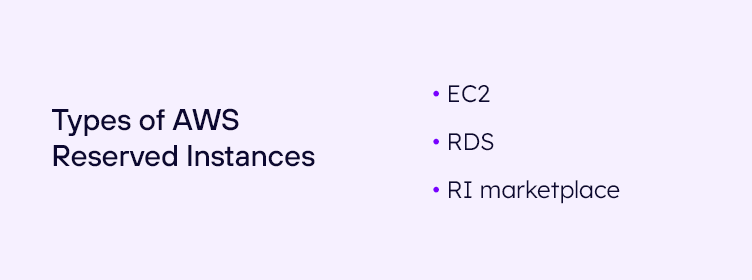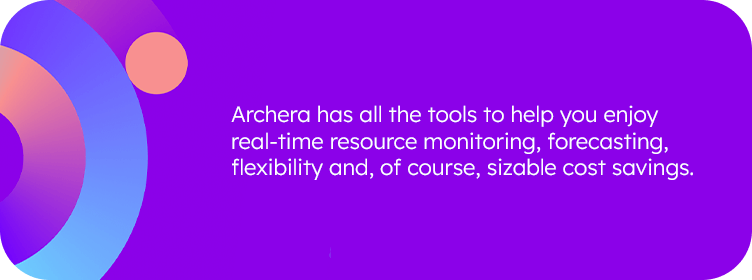What are AWS Reserved Instances?
AWS Reserved Instances
Reserved Instances (RIs) on Amazon Web Services (AWS) are a great cost-saving option for many businesses. For the best results, you'll need to have a strong understanding of your cloud infrastructure and usage. There are a few types of AWS Reserved Instances, each geared toward different operating environments and billing requirements. To get an overview other methods of purchasing AWS resources read our overview. Let's look at these options and how you can identify the right one for your organization.
What Are AWS Reserved Instances?
Virtual servers provided by AWS are known as instances. AWS Reserved Instances are not actually instances, but a model of payment for them. They are billing discounts applied when reserving resources and capacity in certain Availability Zones in a region. Instead of paying for the capacity you use on-demand, Reserved Instances allow you to reserve the capacity ahead of time and pay in different ways with various options, such as paying upfront in full, paying partially upfront or paying monthly.
The discount of AWS Reserved Instances will vary by how you pay and how long your commitment is. The more you pay upfront and the longer your reservations are for, the less you'll pay per hour. You'll be paying based on how much you reserve, not how much you use, so calculating your typical use is essential to getting the most from your Reserved Instances. If you reserve the right amount, your discounts can easily exceed what you would pay for on-demand service.
Reserved Instances are typically best for businesses with steady workloads and usage.
Types of AWS Reserved Instances
Fortunately, AWS offers plenty of variety. RIs can be purchased in terms of one to three years, with discounts offered for all upfront (AURI), partial upfront (PURI) and no upfront (NURI) payments.
You can also find standard and convertible Reserved Instances, which vary by modifiability. Standard Reserved Instances allow you to modify the Availability Zone, networking type, scope and instance size. Convertible Reserved Instances can be exchanged for other Convertible Reserved Instances with varying configurations, such as instance family, tenancy and operating system. Another option is Scheduled RIs, which can be launched within specific time windows, like recurring schedules.
The largest discounts typically come from Standard Reserved Instances that are paid in full upfront for a three-year term.
AWS Reserved Instances fall into one of three categories. Usually, you'll be working with EC2 RIs, but options geared toward databases and marketplace purchases are also available. These options include:
- EC2: EC2 RIs can offer sizable discounts of up to 75% compared to on-demand pricing.
- RDS: These RIs work similarly to EC2 RIs, with discounts for hourly rates and one- to three-year terms for Database Instances.
- RI marketplace: On the RI marketplace, unused Standard Reserve Instances can be resold with varying term lengths and prices.

When to Purchase Reserved Instances
Understanding the impact of Reserved Instances on your operations is part of deciding when it makes financial sense to buy them. Many factors go into this calculation. A big one is utilization, which will help you find your payback period. The payback period is the time of use it takes before you break even and start profiting. If you're working at 100% utilization, the payback is easier to calculate. For intermittent use, such as during a 9-to-5 Monday-to-Friday schedule, it gets trickier.
In these cases, it may take the steepest discounts to achieve financial viability. Another option is to purchase just what you need with Scheduled RIs to meet capacity requirements and use additional on-demand services if needed. In any case, you'll need to calculate utilization.
Many businesses will buy Reserved Instances when they're looking for:
- High return on investment (ROI): Of course, the cost savings of Reserved Instances can be great for your bottom line. If you have predictable usage, RIs are a great way to save on a service you'd be buying anyway. They offer a significant ROI for many organizations.
- Reliability: Another reason to turn to RIs is the reliability they offer. Remember the term "reservation" in the name. Buying one holds your spot and reserves a specific capacity for your organization. If you see variability, knowing you have the capacity in place when needed can provide necessary support.
- Outage protection: A similar option is to use RIs as a failsafe with outages. Consider events that might shut down a server in a specific Availability Zone. If weather or utility problems cause an outage, having RI in another zone means you have reserved capacity set aside for your organization and don't need to worry about losing service. RIs can be a strong form of insurance for many businesses.
Tools to Manage AWS Reserved Instances
Regardless of why you're using RIs, understanding your infrastructure is key to ensuring you make a smart purchasing decision that delivers the highest ROI you can get. Without a dedicated tool, these kinds of calculations can be time-consuming and may lose accuracy. The right solution can ease these processes and help you make smarter assessments about your usage, waste, optimization, cost anomalies and inefficiencies. Rightsizing becomes smoother and more informed.
To make cloud assessment and optimization easier, consider a tool that offers features like:
- Tagging and attribution: The AWS bill alone is not enough for accurate cost attribution. Maintaining the use of tags across pieces of infrastructure can ensure costs are clearly associated with infrastructure. Though important, tag hygiene can be challenging and time consuming. Automatic tagging ensures accurate attribution of costs without requiring manual effort.
- Dynamic use planning: By incorporating historical use data, future plans, and business projections, a cloud analysis program can forecast your usage and the instances needed to cover your infrastructure. Not all planning tools use data in addition to historical usage; make sure to look for planning tools that can model usage and costs for various different scenarios such as product growth or decreased sales.
- Machine learning for purchase and renewal decisions: Once the appropriate instances have been identified for your infrastructure, the appropriate purchasing method must be identified for each resource. Machine learning powered optimization tools can help find the right combination of commitments and purchasing options for your usage and risk tolerance. Not all machine learning tools are created equally, though. If you want to receive the most value, this approach should make purchasing recommendations that are truly optimized based on every variation of contracts, considering different term lengths, and upfront spends for each. Many tools do not blend different types of term lengths and upfront spends, missing out on savings and flexibility.
*** Automated resource management**: To avoid wasting spend, it is important to continuously optimize your commitments. Automating purchasing, exchanging, and renewing ensures that you are not stuck with commitments that are no longer appropriate for your infrastructure. - Cost-anomaly identification: Monitor your usage and costs to watch for and respond to cost anomalies and opportunities to improve your infrastructure. Use tools that can report cost anomalies in live time instead of waiting until your monthly bill arrives.
- Guaranteed reserved instance buy-back: A buy-back option can help you avoid the risk of getting locked into long-term commitments, such as Standard Reserved Instances.
Archera has all these tools in one convenient interface to help you enjoy real-time resource monitoring, forecasting, flexibility and, of course, sizable cost savings. If you're interested in trying out Archera, schedule a demo with our team!



